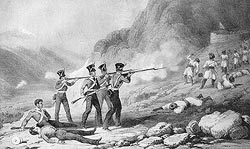Through the Khyber Pass to Jelalabad
After spending five days at Peshawar the 31st moved on to Jamrud at the entrance to the Khyber Pass where the day was spent preparing for the passage through the pass, which was expected to be strongly opposed. The soldiers ensured that their muskets were well cleaned and freshly flinted. Next day nine pounder guns were sited to cover the hillsides and the advance began. The Grenadier No.1 Company of the 31st headed the column on the road and the light companies skirmished along the heights on each side, supported by the 6th Native Infantry. Next on the road came the horse artillery and the rest of the 31st, then the baggage protected by the irregular horse and the rearguard under the commander of the Native Infantry.
 |
| Gallant conduct of four soldiers of the 31st Regiment in Afghanistan. (Click to enlarge) |
The same tactics were adopted each day until the column reached Jelalabad on 6th May having prevented large numbers of tribesmen from mounting significant attacks. Meanwhile the new British Governor-General, Lord Ellenborough, had finally accepted military and political advice that to leave Afghanistan without first recovering Kabul would lead to disaster for British rule in India where there had never been acceptance of defeat. It was therefore decided that Kabul should be re-occupied from Jelalabad following which there would be an orderly withdrawal of British troops from the country.
There was a long delay while supplies were built up. It was hot weather. Sand storms were frequent, the camps were overcrowded and insanitary. There was growing discontent and sickness among the troops which was relieved when the garrison commander, Major-General Pollock, decided to send the 4th Brigade, of which the 31st was part, on a punitive expedition against the Shinwaris, a neighbouring tribe which had been prominent in the massacre of Major-General Elphinstone’s force. The operation took six weeks. Fortified villages were attacked and destroyed, wells were filled in, and mulberry trees, the fruit of which supplemented the limited amount of corn which could be grown, cut down. The only real battle took place at Mazima where the 31st Regiment gained a notable victory. During it four soldiers gallantly held off an attack by fifty Shinwaris and rescued their officer and another soldier who had fallen wounded.
Related
